Ditapis dengan

Civil Society and International Governance:the Role of Non-State Actors in th…
Structures and processes occurring within and between states are no longer the only – or even the most important - determinants of those political, economic and social developments and dynamics that shape the modern world. Many issues, including the environment, health, crime, drugs, migration and terrorism, can no longer be contained within national boundaries. As a result, it is not always …
- Edisi
- -
- ISBN/ISSN
- 9780203840054
- Deskripsi Fisik
- -
- Judul Seri
- -
- No. Panggil
- 341.24 BEL c

Housing market dynamics in Africa
This open access book utilizes new data to thoroughly analyze the main factors currently shaping the African housing market. Some of these factors include the supply and demand for housing finance, land tenure security issues, construction cost conundrum, infrastructure provision, and low-cost housing alternatives. Through detailed analysis, the authors investigate the political economy surroun…
- Edisi
- -
- ISBN/ISSN
- 9781137597922
- Deskripsi Fisik
- xviii, 272p. : ill
- Judul Seri
- -
- No. Panggil
- 330.91732 BAH h

West African youth challenges and opportunity pathways
This open-access edited collection, focusing on Ghana and Nigeria, offers a transatlantic, transnational exploration of barriers that threaten the wellbeing of West African youth—ranging from Black immigrant youth in the American city of Newark, New Jersey, to students in Almajiri Islamic schools in Northern Nigeria. Incorporating themes of migration, vulnerability, and agency and aspirations…
- Edisi
- -
- ISBN/ISSN
- 9783030210922
- Deskripsi Fisik
- -
- Judul Seri
- -
- No. Panggil
- 305.23509667 MCL w
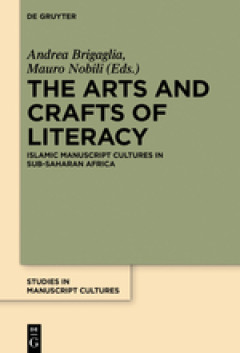
The Arts and crafts of literacy. Islamic manuscript cultures in sub-Saharan A…
During the last two decades, the (re-)discovery of thousands of manuscripts in different regions of sub-Saharan Africa has questioned the long-standing approach of Africa as a continent only characterized by orality and legitimately assigned to the continent the status of a civilization of written literacy.However, most of the existing studies mainly aim at serving literary and historical purpo…
- Edisi
- -
- ISBN/ISSN
- 9783110541441
- Deskripsi Fisik
- x, 367 p.; 22 cm.
- Judul Seri
- -
- No. Panggil
- 091.0967 ART a

Prosecuting international crimes in Africa
Chacha Murungu & Japhet Biegon (editors)
- Edisi
- -
- ISBN/ISSN
- 9780986985782
- Deskripsi Fisik
- xii, 362 p. ; 25 cm.
- Judul Seri
- -
- No. Panggil
- 340 MUR p

African linguistics on the prairie:selected papers from the 45th Annual Confe…
African Linguistics on the Prairie features select revised peer-reviewed papers from the 45th Annual Conference on African Linguistics, held at the University of Kansas. The articles in this volume reflect the enormous diversity of African languages, as they focus on languages from all of the major African language phyla. The articles here also reflect the many different research perspectives …
- Edisi
- -
- ISBN/ISSN
- 9783961100378
- Deskripsi Fisik
- -
- Judul Seri
- -
- No. Panggil
- 496 KAN a
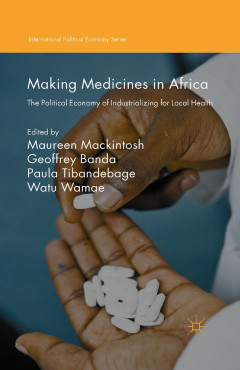
Making medicines in Africa :the political economy of industrializing for loca…
The importance of the pharmaceutical industry in Sub-Saharan Africa, its claim to policy priority, is rooted in the vast unmet health needs of the sub-continent. Making Medicines in Africa is a collective endeavour, by a group of contributors with a strong African and more broadly Southern presence, to find ways to link technological development, investment and industrial growth in pharmaceutic…
- Edisi
- -
- ISBN/ISSN
- 9781137546470
- Deskripsi Fisik
- xxi, 334p. : ill.
- Judul Seri
- -
- No. Panggil
- 338.476151096 MAK m

Industries without smokestacks:industrialization in Africa reconsidered
Structural transformation in Africa has become a hot topic. One of the earliest stylized facts of development economics is that low-income countries have large differences in output per worker across sectors, and movement of workers from low- to high-productivity sectors—structural transformation is a key driver of economic growth. Between 1950 and 2006, about half of the catch-up by developi…
- Edisi
- -
- ISBN/ISSN
- 9780198821885
- Deskripsi Fisik
- -
- Judul Seri
- -
- No. Panggil
- 338.9 IND i
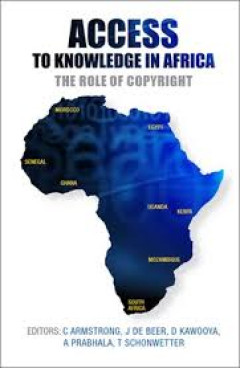
Access to knowledge in Africa :the role of copyright
The emergence of the Internet and the digital world has changed the way people access, produce and share information and knowledge. Yet people in Africa face challenges in accessing scholarly publications, journals and learning materials in general. At the heart of these challenges, and solutions to them, is copyright, the branch of intellectual property rights that covers written and related w…
- Edisi
- -
- ISBN/ISSN
- 9781552504901
- Deskripsi Fisik
- xv, 357 p.; 22 cm.
- Judul Seri
- -
- No. Panggil
- 346.60482 ACC a

Access to knowledge in Africa :the role of copyright
The emergence of the Internet and the digital world has changed the way people access, produce and share information and knowledge. Yet people in Africa face challenges in accessing scholarly publications, journals and learning materials in general. At the heart of these challenges, and solutions to them, is copyright, the branch of intellectual property rights that covers written and related w…
- Edisi
- -
- ISBN/ISSN
- 9781552504901
- Deskripsi Fisik
- xv, 357 p.; 22 cm.
- Judul Seri
- -
- No. Panggil
- 346.60482 ACC a

Theologies of childhood and the children of Africa
The purpose of this book is to combine perspectives of scholars from Africa on Child Theologies from a variety of theological sub-disciplines to provide some theological and ministerial perspectives on this topic. The book disseminates original research and new developments in this study field, especially as relevant to the African context. In the process it addresses also the global need to he…
- Edisi
- -
- ISBN/ISSN
- 9781928396109
- Deskripsi Fisik
- xx, 326 p.; 22 cm.
- Judul Seri
- -
- No. Panggil
- 822 THE t

Biological invasions in South Africa
This open access volume presents a comprehensive account of all aspects of biological invasions in South Africa, where research has been conducted over more than three decades, and where bold initiatives have been implemented in attempts to control invasions and to reduce their ecological, economic and social effects. It covers a broad range of themes, including history, policy development and …
- Edisi
- -
- ISBN/ISSN
- 9783030323943
- Deskripsi Fisik
- xxiv, 975p. : ill.
- Judul Seri
- -
- No. Panggil
- 577.18 BIO b
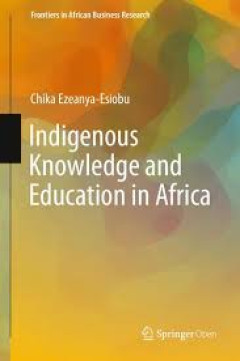
Indigenous knowledge and education in Africa
This open access book presents a strong philosophical, theoretical and practical argument for the mainstreaming of indigenous knowledge in curricula development, and in teaching and learning across the African continent. Since the dawn of political independence in Africa, there has been an ongoing search for the kind of education that will create a class of principled and innovative citizens wh…
- Edisi
- -
- ISBN/ISSN
- 9789811366352
- Deskripsi Fisik
- -
- Judul Seri
- -
- No. Panggil
- 370.96 EZE i

Research universities in Africa
This book is certainly different from previous publications in several respects. First, it is the only book to include an analysis of eight African universities based on the full 15 years of empirical data collected by the project. It is true that the data are available in the report ‘An Empirical Overview of Emerging Research Universities in Africa 2001-2015’ and as open data on the web. …
- Edisi
- -
- ISBN/ISSN
- 9781928331889
- Deskripsi Fisik
- xiv, 293 p.; 24 cm.
- Judul Seri
- -
- No. Panggil
- 378.6 CLO r
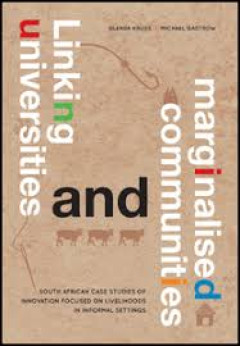
Linking universities and marginalised communities:South African case studies …
South African universities are mandated to promote scholarship that is socially and economically responsive to local contexts. The contribution of universities to innovation is a key driver of economic and social development, but should be more effectively harnessed to address poverty and inequality. Linking Universities and Marginalised Communities examines how South African universities en…
- Edisi
- -
- ISBN/ISSN
- 9781552505670
- Deskripsi Fisik
- xiii, 128 p.
- Judul Seri
- -
- No. Panggil
- 378.103 KRU l

Toward shared Research:participatory and integrative approach in researching …
Intercultural, interdisciplinary, and transdisciplinary research interfaces confront researchers with considerable challenges. Towards Shared Research portrays how scholars from different disciplinary and geographical origins and at various academic career stages strive for a more inclusive and better understanding of knowledge about African environments. The book is addressed to researchers, f…
- Edisi
- -
- ISBN/ISSN
- 9783839451502
- Deskripsi Fisik
- 186p.: ill.
- Judul Seri
- -
- No. Panggil
- 630.967 TOW t
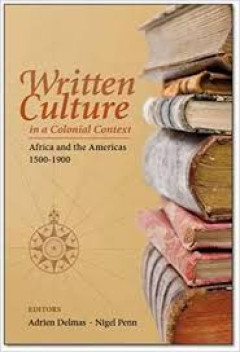
Written Culture in a Colonial Context:Africa and the Americas 1500-1900
There is very little in the modern literature on the history of written culture that describes the specific practices related to writing that were anchored in colonial contexts. It was not just ships, soldiers, missionaries and settlers that drove the process of European expansion from the 16th to the 19th centuries. The circulation of images, manuscripts and books between different continents …
- Edisi
- -
- ISBN/ISSN
- 9781919895260
- Deskripsi Fisik
- -
- Judul Seri
- -
- No. Panggil
- 302.224409 DEL w

Impact of Formal and Informal Institutions on Economic Growth:A Case Study on…
Regarding the Arab region, GDP per capita virtually stagnated for more than 20 years from 1980. During the same period, GDP per capita in the world’s highly industrialized states further increased and the gap between the Middle East and North Africa (MENA) and the highly developed countries widened. However, the differences between Arab countries and the Western states exist not only economic…
- Edisi
- -
- ISBN/ISSN
- 9783631616161
- Deskripsi Fisik
- xvi, 234 pages ; 22 cm.
- Judul Seri
- -
- No. Panggil
- 338.956 DOB i

Mobilising social justice in South Africa:perspectives from researchers and p…
Jeff Handmaker & Remko Berkhout (editors)
- Edisi
- -
- ISBN/ISSN
- 9780986985706
- Deskripsi Fisik
- xviii, 208 p. : ill. ; 25 cm.
- Judul Seri
- -
- No. Panggil
- 323.0420968 HAN m

Shrines in Africa:history, politics, and society
In the African context, shrines are cultural signposts that help one understand and read the ethnic, territorial, and social lay of the land. The contributions gathered here by Allan Charles Dawson demonstrate how African shrines help to define ethnic boundaries, shape group identity, and symbolically articulate a society's connection with the land it occupies. Shrines are physical manifestatio…
- Edisi
- -
- ISBN/ISSN
- 9781552385449
- Deskripsi Fisik
- 1 online resource (XV11, 210 pages)
- Judul Seri
- -
- No. Panggil
- 200.96 DAW s
 Karya Umum
Karya Umum  Filsafat
Filsafat  Agama
Agama  Ilmu-ilmu Sosial
Ilmu-ilmu Sosial  Bahasa
Bahasa  Ilmu-ilmu Murni
Ilmu-ilmu Murni  Ilmu-ilmu Terapan
Ilmu-ilmu Terapan  Kesenian, Hiburan, dan Olahraga
Kesenian, Hiburan, dan Olahraga  Kesusastraan
Kesusastraan  Geografi dan Sejarah
Geografi dan Sejarah